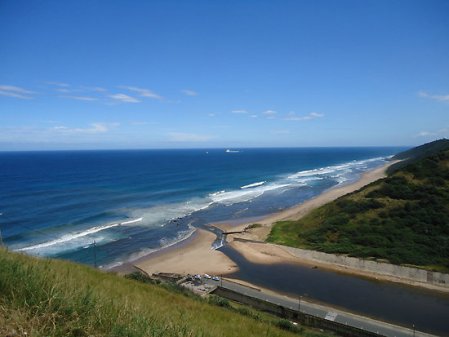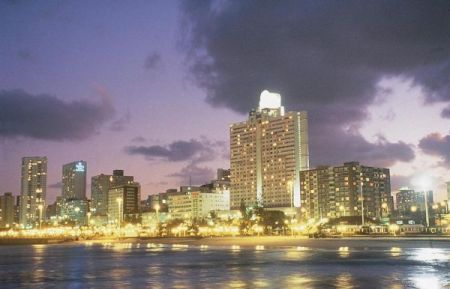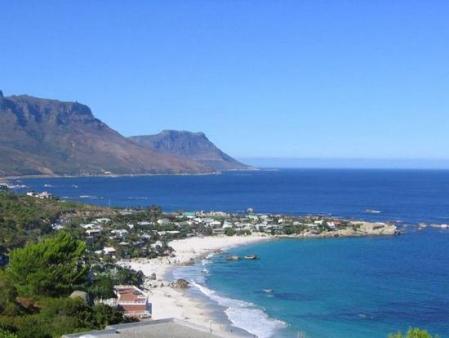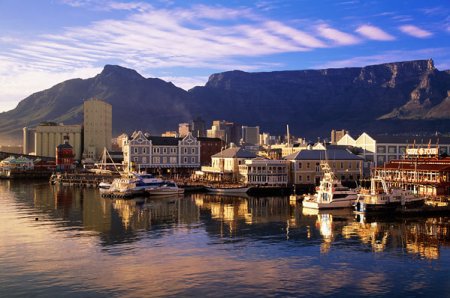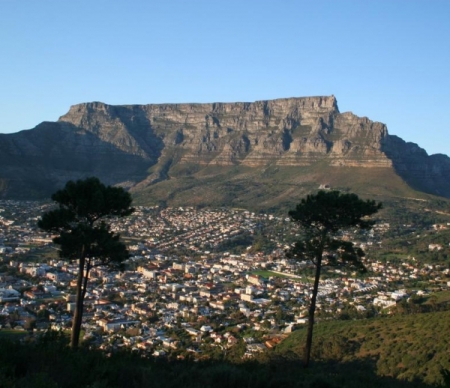The most famous landmark in South Africa located in the capital city of Cape Town, namely the Table Mountain. It is a part of Table Mountain National Park. Located at the height 1085 meters above sea level, it makes the Table Mountain can be seen from long distances. For those of you who has hobby of adventure especially in hiking, climb to the summit of Table mountain will be a great experienced. The summit has an area about 3 kilometers wide, you can see an amazing views from here.
Hiển thị các bài đăng có nhãn Cape Town. Hiển thị tất cả bài đăng
Hiển thị các bài đăng có nhãn Cape Town. Hiển thị tất cả bài đăng
Durban Travel Guide
5/13/2012
Located on the E coast of South Africa, Durban is the largest city of
the Kwa-Zulu Natal province and 3rd largest city of South Africa. A
coastal port with wide golden beaches, Durban is a tourist hotspot and
gateway to the dozens of seaside resort towns of the coast to the N and S
of the city.
Durban is a lively (and slightly tacky) prepackaged seaside destination. The beachfront features a variety of high-rise hotels and snack bars stretching a distance of four miles (6km) and is fronted by promenades and entertainment facilities with many things to see and do, such as a skatepark, flea markets and colourful traditionally clad Zulu rickshaw pullers. Whilst this is the city’s trademark, the city centre featuring some grandiose colonial buildings and fascinating Art Deco architecture, is also a feature of the city.
While the beachfront is still a favourite spot, many visitors, wary of the city’s increasing reputation for crime, base themselves in the suburbs, which are chock-a-block with accommodation, shopping malls, funky bars and stylish eateries.
Durban is the gateway not only to the coastal beach resorts of the province, but also to the rolling hills and plains of the Natal Midlands and their backdrop, the majestic, jagged peaks of the Drakensberg Mountains, which border the province in the west.
Durban is located on the E coast of South Africa, in the province of KwaZulu-Natal. It is 1,050 mls NE of Cape Town; 575 mls NE of Port Elizabeth; 370 mls SE of Johannesburg and its international airport. 12 mls N of Durban International Airport. It is positioned on fairly flat land facing E onto the Indian Ocean and S onto the Bay of Natal, one of the world’s largest natural harbours.
Durban is often billed as South Africa’s premier holiday destination and, for the national population, it probably is so. However, mass-market appeal has created a fairly tacky seaside resort similar to many of the larger Spanish ones at their worst. Unless visiting friends or relatives, there are better places to spend valuable time in the country. If a seaside break is essential between safaris and Cape Town, Umhlanga Rocks, 11 mls N, is a more attractive option.
Accommodation consists of one 5-star, one 4-star and a whole raft of beachfront tower blocks in the 3-star category, which says something about the type of market attracted here. Many of the older hotels have upgraded and refurbished in anticipation of the expected tourist boom. Several more, mainly modern, hotels at Umhlanga Rocks.
Beachwise there is a huge, broad stretch of golden sand running the whole length of the Golden Mile and beyond. Separated by piers and variously called North Beach, Dairy Beach and South Beach. Umhlanga Rocks has slightly narrower but equally sandy beaches separated by rocky promontories. The Indian Ocean can be rough and there are sharks off this coast, so it is advisable to swim only where it is recommended and within view of lifeguards. Shark netting exists along the whole of the Golden Mile.
Shoppers are greated with a wide selection of options, from large stores to boutiques, markets and Zulu women street hawkers all along the beach front. The “Tourist Junction” building has plenty of small tourist shops, housed in old railway workshops. Indian market for curry spices, teak chests, brass etc. Various upmarket suburban malls, such as Pavilion near Westville and Gateway at Umhlanga (which even has cinemas and a theatre).
Entertainment and activities include: various Victorian buildings, including City Hall (which has a library, art gallery and natural history museum). Da Gama Clock. Amphitheatre Gardens. Botanical gardens, several parks and sports stadiums. Minitown, with models of many Durban buildings. Beachfront funfair. Sea World aquarium and dolphinarium. Snake park. Jumah Mosque. Plenty more things to pass the time if not on the beach. By night there is some culture with concerts and shows, but mainly devoted to bars, discos and nightclubs operating till late.
Durban offer plenty of restaurants (both in and out of hotels) reflecting the city’s cosmopolitan nature. Lots of cheaper options at steakhouses, pizzerias, burger bars and other fast-food eateries.
Public transport is not advised. Taxis are best ordered through your hotel, which will normally have a fixed contract. Car hire will give greater freedom. Rickshaw rides pulled by Zulu “warriors” along Golden Mile.
Local excursions include a tour of Durban by Night, Oriental drive/Indian market, various harbour cruises, various tours to the N and S coasts, inland, game reserves, Zulu villages, battlefields and Drakensberg Mountains.
Durban is a lively (and slightly tacky) prepackaged seaside destination. The beachfront features a variety of high-rise hotels and snack bars stretching a distance of four miles (6km) and is fronted by promenades and entertainment facilities with many things to see and do, such as a skatepark, flea markets and colourful traditionally clad Zulu rickshaw pullers. Whilst this is the city’s trademark, the city centre featuring some grandiose colonial buildings and fascinating Art Deco architecture, is also a feature of the city.
While the beachfront is still a favourite spot, many visitors, wary of the city’s increasing reputation for crime, base themselves in the suburbs, which are chock-a-block with accommodation, shopping malls, funky bars and stylish eateries.
Durban is the gateway not only to the coastal beach resorts of the province, but also to the rolling hills and plains of the Natal Midlands and their backdrop, the majestic, jagged peaks of the Drakensberg Mountains, which border the province in the west.
Durban is located on the E coast of South Africa, in the province of KwaZulu-Natal. It is 1,050 mls NE of Cape Town; 575 mls NE of Port Elizabeth; 370 mls SE of Johannesburg and its international airport. 12 mls N of Durban International Airport. It is positioned on fairly flat land facing E onto the Indian Ocean and S onto the Bay of Natal, one of the world’s largest natural harbours.
Durban is often billed as South Africa’s premier holiday destination and, for the national population, it probably is so. However, mass-market appeal has created a fairly tacky seaside resort similar to many of the larger Spanish ones at their worst. Unless visiting friends or relatives, there are better places to spend valuable time in the country. If a seaside break is essential between safaris and Cape Town, Umhlanga Rocks, 11 mls N, is a more attractive option.
Accommodation consists of one 5-star, one 4-star and a whole raft of beachfront tower blocks in the 3-star category, which says something about the type of market attracted here. Many of the older hotels have upgraded and refurbished in anticipation of the expected tourist boom. Several more, mainly modern, hotels at Umhlanga Rocks.
Beachwise there is a huge, broad stretch of golden sand running the whole length of the Golden Mile and beyond. Separated by piers and variously called North Beach, Dairy Beach and South Beach. Umhlanga Rocks has slightly narrower but equally sandy beaches separated by rocky promontories. The Indian Ocean can be rough and there are sharks off this coast, so it is advisable to swim only where it is recommended and within view of lifeguards. Shark netting exists along the whole of the Golden Mile.
Shoppers are greated with a wide selection of options, from large stores to boutiques, markets and Zulu women street hawkers all along the beach front. The “Tourist Junction” building has plenty of small tourist shops, housed in old railway workshops. Indian market for curry spices, teak chests, brass etc. Various upmarket suburban malls, such as Pavilion near Westville and Gateway at Umhlanga (which even has cinemas and a theatre).
Entertainment and activities include: various Victorian buildings, including City Hall (which has a library, art gallery and natural history museum). Da Gama Clock. Amphitheatre Gardens. Botanical gardens, several parks and sports stadiums. Minitown, with models of many Durban buildings. Beachfront funfair. Sea World aquarium and dolphinarium. Snake park. Jumah Mosque. Plenty more things to pass the time if not on the beach. By night there is some culture with concerts and shows, but mainly devoted to bars, discos and nightclubs operating till late.
Durban offer plenty of restaurants (both in and out of hotels) reflecting the city’s cosmopolitan nature. Lots of cheaper options at steakhouses, pizzerias, burger bars and other fast-food eateries.
Public transport is not advised. Taxis are best ordered through your hotel, which will normally have a fixed contract. Car hire will give greater freedom. Rickshaw rides pulled by Zulu “warriors” along Golden Mile.
Local excursions include a tour of Durban by Night, Oriental drive/Indian market, various harbour cruises, various tours to the N and S coasts, inland, game reserves, Zulu villages, battlefields and Drakensberg Mountains.
Cape Town Travel Guide
5/06/2012
Cape Town is the most popular international tourist destination in
South Africa due to its good climate, natural setting, and relatively
well-developed infrastructure.
The city has several well-known natural features that attract
tourists, most notably Table Mountain, which forms a large part of the
Table Mountain National Park and is the back end of the City Bowl.
Reaching the top of the mountain can be achieved either by hiking up, or
by taking the Table Mountain Cableway. Cape Point is recognised as the
dramatic headland at the end of the Cape Peninsula. Many tourists also
drive along Chapman’s Peak Drive, a narrow road that links Noordhoek
with Hout Bay, for the views of the Atlantic Ocean and nearby mountains.
It is possible to either drive or hike up Signal Hill for closer views
of the City Bowl and Table Mountain.
Cape Town is noted for its architectural heritage, with the highest
density of Cape Dutch style buildings in the world. Cape Dutch style,
which combines the architectural traditions of the Netherlands, Germany
and France, is most visible in Constantia, the old government buildings
in the Central Business District, and along Long Street. The Artscape
Theatre Centre is the main performing arts venue in Cape Town.Capetown
is located on the extreme south west tip of South Africa, (it is 875 mls
SW of Johannesburg, 1,050 mls SW of Durban and 475 mls W of Port
Elizabeth. International airport is 12 mls E). It is to the north coast
of the “hook” of the Cape of Good Hope, with the Atlantic to the west
and False Bay, almost the start of the Indian Ocean, to the East.
Cape Town offers a dozen or so beaches which are popular with local
residents. Due to the city’s unique geography, it is possible to visit
several different beaches in the same day, each with a different setting
and atmosphere. Beaches located on the Atlantic Coast tend to have very
cold water from the Benguela current which originates from the Southern
Ocean. The water at False Bay beaches is often warmer by up to 10 °C
(18 °F). Both coasts are equally popular, although the beaches in
affluent Clifton and elsewhere on the Atlantic Coast are better
developed with restaurants and cafés, with a particularly vibrant strip
of restaurants and bars accessible to the beach at Camps Bay. Boulders
Beach near Simon’s Town is known for its colony of African penguins.
Surfing is popular and the city hosts the Red Bull Big Wave Africa
surfing competition every year.The city has several notable tourist
attractions. The Victoria & Alfred Waterfront, built on top of part
of the docks of the Port of Cape Town, is one of the city’s most popular
shopping venues, with several hundred shops and the Two Oceans
Aquarium. Part of the charm of the V&A, as it is locally known, is
that the Port continues to operate and visitors can watch ships enter
and leave. The V&A also hosts the Nelson Mandela Gateway, through
which ferries depart for Robben Island. It is possible to take a ferry
from the V&A to Hout Bay, Simon’s Town and the Cape Fur Seal
colonies on Seal and Duiker Islands. Several companies offer tours of
the Cape Flats, a mostly Coloured township, and Khayelitsha, a mostly
black township. An option is to sleep overnight in Cape Town’s
townships. There are several B&Bs where you can spend a safe and
real African night. Other popular tourist spots include the Table Bay
harbour, museums and galleries, castle, Parliament building, Tuynhuis
(State President’s mansion) and Groote Kerk church (oldest in SA); Table
Mountain cable car; brewery tours; Robben Island, the maximum-security
prison where Nelson Mandela was held; cricket and rugby at Newlands
Stadium.
The nightlife offers bars, discos and nightclubs which congregate around
the Sea Point area.For food there is plenty of choice, from local
cuisine to European and Malay, and of universally good quality; many
restaurants are in hotels. Prices are generally reasonable. Fish and
shellfish are specialities.
Đăng ký:
Bài đăng (Atom)



